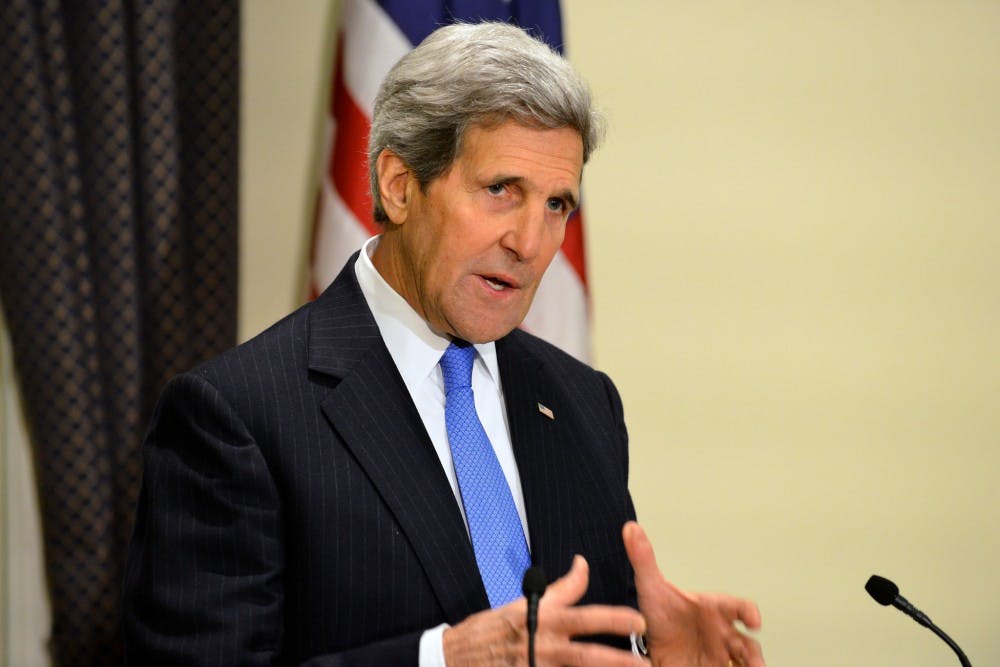
The colloquium was titled "How Emerging Technologies are Rewiring the Global Order."
Former Secretary of State John Kerry spoke at Tuesday’s 2019 Global Order Colloquium at Perry World House, calling for urgent action to reverse climate change and criticizing President Donald Trump's handling of Iran.
Other distinguished world figures also discussed artificial intelligence, social media, and democracy.
The colloquium, "How Emerging Technologies are Rewiring the Global Order," featured a keynote address by Penn President Amy Gutmann and conversations with Kerry, former President of Kyrgyzstan Roza Otunbayeva, former United States Secretary of Defense Ash Carter, Executive Director of the Human Rights Watch Kenneth Roth, and Uber Chief Scientist Raquel Urtasun.
Here are five main takeaways.
Kerry: climate change is an “emergency”
Drawing from his experience negotiating the 2016 Paris Climate Agreement (from which the United States withdrew in 2017), Kerry underscored the urgency of American action on climate change.
“We need to behave like we are in a war,” he said, noting that humanity was on a path toward Earth's sixth mass extinction.
However, Kerry said that the United States re-entering the Paris Climate Agreement would not be enough, as world temperatures would still warm by 3.7 degrees Celsius, well above a target threshold of 2 degrees Celsius.
He suggested large-scale investments in America’s solar and wind capacities, adding that it was absurd that most of the United States lacks the grid capacity to handle these renewable energies even when both are now cheaper than coal.
Kerry was more ambivalent towards geoengineering, which involves removing greenhouse gases from the atmosphere and introducing aerosols into the atmosphere to deflect sunlight. He cautioned that there was not enough information on the potential consequences of these approaches.
Kerry: Trump's Iran policy is flawed
During his time as President Barack Obama's Secretary of State, Kerry also brokered an international agreement that intended to slow the pace at which Iran could obtain nuclear weapons.
The Trump administration has since pulled out of the deal and Kerry criticized the current U.S. policy toward the nation.
"This is not smart diplomacy," Kerry said, referring to the administration's decision to abruptly rip apart the deal without consulting allies. He said that if the president disagreed with the deal, he should have first notified allies and allowed for a waiting period of two years for renegotiations before withdrawing.
Although Kerry said Trump's actions put America and the Middle East at risk, he remained optimistic that war with Iran would be averted.

Roth: social media, despite flaws, is “fantastic” for human rights
As social media weathers attacks from all corners of society, Roth wanted the audience to know that he was a fan.
Describing social media as a “fantastic avenue for whistleblowing,” Roth noted that social media provided a platform for anyone with a phone to expose corruption. He cited a recent instance in Egypt where a single construction worker triggered waves of protests against President Abdel Fattah al-Sisi after venting his frustrations with the current regime on Facebook.
“Traditional journalism required you to be physically there,” Roth said. Now, Roth said everyone can collect evidence.
While he conceded that social media platforms have also been a “key purveyor of falsehoods” because of the temptation to post provocative content, Roth said he would not wish to return to a world without them.
Otunbayeva: Kyrgyzstan still stands by democracy
It being a small, landlocked Central Asian nation at the crossroads of China and Russia, Otunbayeva acknowledged that governing Kyrgyzstan was a complicated affair.
Otunbayeva acceded to the presidency amid the 2010 Kyrgyzstan Revolution, which deposed former President Kurmanbek Bakiyev and left between 40 and 100 people dead.
When asked if her experiences made her skeptical of democracy, especially against the appeal of China’s authoritarian model, Otunbayeva maintained that there was no question about her belief in parliamentary democracy. She noted that Kyrgyzstan’s constitution mandates elections and a balance of power.
She praised Western democracies, even saying that “[the political system in Kyrgyzstan] should be like Great Britain today." She also highlighted the role that the United States played in the democratization of her nation after the collapse of the U.S.S.R.
Carter: fully autonomous weapons are unrealistic
Carter was bleak in his assessment of autonomous weapons, which have been met with opposition from the United Nations. Such weapons include robots that can search and fire at targets without human input.
“We cannot be in a position where no one is responsible,” he said, adding that the American people would not be able to accept a scenario where the military used force but no human being was accountable.
Earlier, Kerry had expressed similar skepticism on the role of autonomous weapons.
"We're not going to have war managed by [artificial intelligence] — no way this is going to happen," Kerry said.
The Daily Pennsylvanian is an independent, student-run newspaper. Please consider making a donation to support the coverage that shapes the University. Your generosity ensures a future of strong journalism at Penn.
Donate







